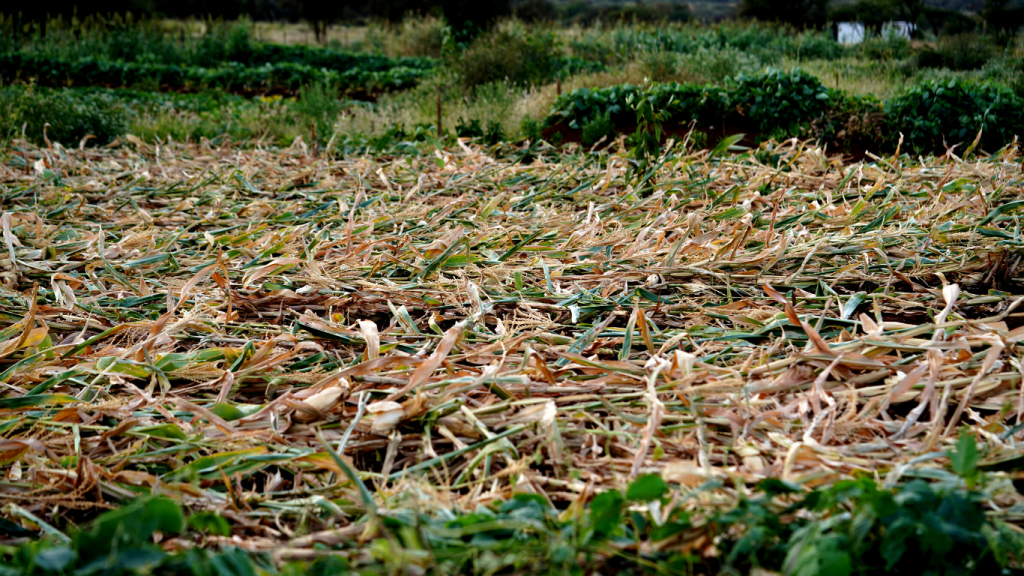
Mulching is a technique used in farming to conserve water and improve soil health by covering the soil surface with organic materials like live plants, leaves, or compost. This layer acts as a protective barrier, reducing evaporation and erosion while promoting moisture retention in the soil.
How we Mulch as an Organic Farm in a Semi-Arid Area
Selecting the Right Mulch: Choose organic materials suitable for the local climate and soil conditions and the type of mulch.
At Ambokili Farm, we practice both live mulching and dead mulching. Live mulch which involves use of life plants like pumpkin or the Mukuna bean which is the main live mulch we use. It has a variety of benefits from fixing nitrogen into the soil to conservation of moisture and improvement of soil structure. Outside the farm and on the plate, researchers show that consumption of the Mukuna bean is beneficial to the brain and had a close comparison to Omega 3.
When it comes to dead mulching, just as the name suggests, we use dead plant material. For example, after harvesting maize, the maize stubble or maize residue is put along the beds on the Farm to act as mulch. This has several advantages, by putting them along the beds, we do not have to dig again. Secondly, when they decompose, they release nutrients into the soil thus acting as a slow-release fertiliser. Moreover, they improve soil structure at the Farm, especially in regions with sandy soils.
Preparation: Clear the area of weeds and debris before applying mulch.
Application: Spread a layer of mulch around plants. Apply a 2- to 4-inch layer of mulch around your plants, leaving a few inches of bare space around the stem to prevent rot.
Maintenance: Periodically replenish mulch as it decomposes and adjust thickness as needed.
Why Mulching Matters to Us?
Mulching is essential for Ambokili Farm for several reasons:
Water Conservation: By reducing evaporation by up to 70%, and runoff, mulch helps retain moisture in the soil, reducing the need for irrigation.
Soil Health: Mulch provides organic matter to the soil, improving its structure, fertility, and microbial activity. As mulch decomposes, it feeds beneficial soil microbes, leading to improved soil fertility and structure. This translates to healthier, more resilient plants.
Weed Suppression: A thick layer of mulch suppresses weed growth, reducing competition for water and nutrients.
Erosion Control: Mulch protects the soil from erosion caused by wind and water, preserving its integrity and preventing nutrient loss.
Improved Water Infiltration: Mulch helps rainwater soak deeper into the soil, preventing runoff and maximising the water available to your crops.
Temperature Regulation: Mulch helps regulate soil temperature, keeping it cool during scorching heat and warmer during chilly nights. This creates a stable environment for optimal plant growth.
Organic Permaculture and Mulching
Organic permaculture embodies a holistic approach to agriculture, emphasising harmony with nature to establish sustainable and self-sufficient farming systems.
By harnessing locally available organic materials for mulching, permaculture farms minimise reliance on external inputs, thereby promoting a closed-loop system that operates in tandem with nature’s rhythms. This approach not only reduces waste by utilising crop residues and farm by-products but also fosters the development of a self-sustaining ecosystem. Mulch serves as a potent agent in nurturing soil health over the long term, aligning seamlessly with permaculture’s fundamental principles of sustainability. Furthermore, the dense layer of mulch effectively shades the soil, impeding weed growth and mitigating the necessity for herbicides, thereby upholding the Farm’s organic integrity. Through these multifaceted benefits, mulching emerges as a beneficial practice in cultivating thriving organic permaculture farms that flourish in harmony with the natural world.
Benefits of Mulching
Water Conservation: Mulching reduces water usage by up to 50% by minimising evaporation and runoff.
Improved Soil Quality: Organic mulch enriches the soil with nutrients, enhances microbial activity, and promotes root development.
Weed Control: Mulch suppresses weed growth, reducing the need for herbicides and manual labour. Saves time and resources spent on weeding.
Climate Resilience: Mulching helps mitigate the impacts of climate change by maintaining soil moisture levels and protecting against extreme weather events.
Increased Food Security: Efficient water use leads to higher yields and contributes to a more resilient food system.
Mulching is a simple yet powerful technique that offers a multitude of benefits for organic farms in drylands. By minimising water loss, enriching soil, and promoting healthy plant growth, mulching contributes to a more sustainable and productive agricultural system.
Start mulching your organic farm today and experience the incredible benefits firsthand. It’s a simple, low-cost practice with a powerful impact on your farm’s productivity, water resources, and the overall well-being of our planet.
